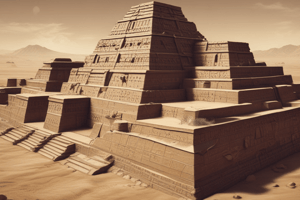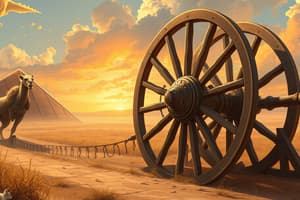Podcast
Questions and Answers
What major contribution is associated with the Babylonian civilization?
What major contribution is associated with the Babylonian civilization?
- The coliseum
- The Great Wall of China
- The hanging gardens (correct)
- Gunpowder
Which ancient civilization is known for inventing the first writing system called cuneiform?
Which ancient civilization is known for inventing the first writing system called cuneiform?
- Greek
- Sumerian (correct)
- Babylonian
- Egyptian
Which of the following was a significant achievement of the Egyptians?
Which of the following was a significant achievement of the Egyptians?
- Construction of aqueducts
- Creation of papyrus (correct)
- Development of the alarm clock
- Invention of gunpowder
Which civilization is credited with the establishment of the Olympic Games?
Which civilization is credited with the establishment of the Olympic Games?
What advancement is the Roman Empire particularly known for in terms of infrastructure?
What advancement is the Roman Empire particularly known for in terms of infrastructure?
Which of the following inventions is attributed to Johann Gutenberg?
Which of the following inventions is attributed to Johann Gutenberg?
Which ancient civilization is known for the silk trade and the production of gunpowder?
Which ancient civilization is known for the silk trade and the production of gunpowder?
In which period was the printing press developed to accelerate the publication of books?
In which period was the printing press developed to accelerate the publication of books?
What significant model did Nicolaus Copernicus propose?
What significant model did Nicolaus Copernicus propose?
What principle does the ID operate on according to Sigmund Freud's theory?
What principle does the ID operate on according to Sigmund Freud's theory?
Which of the following best describes the Theory of Evolution by Natural Selection?
Which of the following best describes the Theory of Evolution by Natural Selection?
What was one of the main contributions of the Age of Enlightenment?
What was one of the main contributions of the Age of Enlightenment?
What innovation is NOT associated with the Industrial Revolution?
What innovation is NOT associated with the Industrial Revolution?
Which aspect of human behavior does Freud’s superego primarily regulate?
Which aspect of human behavior does Freud’s superego primarily regulate?
During which century did the major innovations of the Industrial Revolution begin?
During which century did the major innovations of the Industrial Revolution begin?
What was the consequence of Nicolaus Copernicus' heliocentric theory?
What was the consequence of Nicolaus Copernicus' heliocentric theory?
What was one of the primary contributions of Federico Faura in 1897?
What was one of the primary contributions of Federico Faura in 1897?
What major event occurred in 1957 that affected the scientific community in the Philippines?
What major event occurred in 1957 that affected the scientific community in the Philippines?
Which organization was established under the Science Act of 1957 to guide science policy in the Philippines?
Which organization was established under the Science Act of 1957 to guide science policy in the Philippines?
What significant action did President Ferdinand E. Marcos take to enhance agricultural science?
What significant action did President Ferdinand E. Marcos take to enhance agricultural science?
Which organization did Corazon Aquino establish to replace the National Science and Technology Authority?
Which organization did Corazon Aquino establish to replace the National Science and Technology Authority?
What was the primary goal of the Presidential Task Force for Science and Technology during Corazon Aquino’s presidency?
What was the primary goal of the Presidential Task Force for Science and Technology during Corazon Aquino’s presidency?
What was a major factor contributing to the deterioration of science and technology noted in 1957?
What was a major factor contributing to the deterioration of science and technology noted in 1957?
What institution was created to explore the use of atomic energy for economic development?
What institution was created to explore the use of atomic energy for economic development?
What notable contribution did the Maya civilization make in the field of astronomy?
What notable contribution did the Maya civilization make in the field of astronomy?
Which technology was NOT developed by ancient Chinese civilizations?
Which technology was NOT developed by ancient Chinese civilizations?
Which scholar is known as the 'father of algebra'?
Which scholar is known as the 'father of algebra'?
What was the primary focus of Ibn al-Haytham's work?
What was the primary focus of Ibn al-Haytham's work?
Which of the following advancements is attributed to Indian mathematicians?
Which of the following advancements is attributed to Indian mathematicians?
What impact did Al-Khwarizmi's work have on future mathematics?
What impact did Al-Khwarizmi's work have on future mathematics?
What feature distinguishes the architectural achievements of the Maya civilization?
What feature distinguishes the architectural achievements of the Maya civilization?
Which region is noted for significant scientific innovation during the Islamic Golden Age?
Which region is noted for significant scientific innovation during the Islamic Golden Age?
What was Ibn Sina also known as?
What was Ibn Sina also known as?
Which of the following best describes the contributions of ancient African civilizations?
Which of the following best describes the contributions of ancient African civilizations?
What is the significance of 'The Canon of Medicine' authored by Ibn Sina?
What is the significance of 'The Canon of Medicine' authored by Ibn Sina?
In what areas did ancient Filipinos demonstrate indigenous science and technology?
In what areas did ancient Filipinos demonstrate indigenous science and technology?
Which ancient civilization is noted for developing a thriving iron industry?
Which ancient civilization is noted for developing a thriving iron industry?
Which of the following inventions is NOT associated with the ancient Egyptians?
Which of the following inventions is NOT associated with the ancient Egyptians?
What major role does science and technology play in nation building?
What major role does science and technology play in nation building?
Which aspect of ancient Filipino life showcased their use of indigenous technology?
Which aspect of ancient Filipino life showcased their use of indigenous technology?
Flashcards are hidden until you start studying
Study Notes
Historical Antecedents in the Course of Science and Technology
-
Sumerians
- Developed cuneiform, the first writing system.
- Innovations in agriculture included the plow, irrigation, dikes, and the wheel, enhancing food production.
- Utilized rivers and seas for transportation and constructed the first known roads.
-
Babylonian Civilization
- Located by the Tigris and Euphrates rivers, known for architectural and engineering advances.
- Famous for the Hanging Gardens of Babylon, one of the seven wonders.
-
Egyptians
- Renowned for artifacts like Tutankhamun's death mask and the Pyramid of Giza.
- Innovations included the water clock (clepsydra), papyrus, ink, and hieroglyphics.
- Cosmetics and wigs were developed for aesthetic purposes and sun protection.
-
Greeks
- Birthplace of Western philosophy, with significant contributions to philosophy and mathematics.
- Key inventions included the coliseum, alarm clock, and water mill.
-
Roman Empire
- Dominated politics and governance, setting standards for codified laws.
- Mastered architecture and engineering with structures like aqueducts, churches, and the coliseum.
- Created the Roman numeral system.
-
China
- Oldest known civilization in Asia, significant for silk trade and inventions like gunpowder and paper.
Science and Technology in the Middle Ages (Age of Exploration)
-
Printing Press
- Johann Gutenberg revolutionized printing with a cast type press, enhancing information dissemination.
- Made literature accessible, aiding literacy and knowledge spreading.
-
American Regime in the Philippines
- Saw rapid development in science and technology with scholarships in science and engineering.
- Introduced public education, vocational courses, and public health programs.
- Established research agencies, including the University of the Philippines Los Baños.
Post-Colonial Science and Technology in the Philippines
-
1957 Science Decline
- Notable deterioration due to lack of support, loss of trained scientists, and low public awareness.
- Enactment of the Science Act of 1958 to establish the National Science Development Board (NSDB).
-
Science Act of 1957
- Created the Philippine Atomic Energy Commission (PAEC) and agencies like the National Institute of Science and Technology.
- Aimed at using atomic energy for economic development and modernizing industries.
-
Marcos Administration
- Increased funding for science education and agricultural development.
- Established agencies for agricultural research and environmental protection like PAGASA.
-
Aquino Administration
- Transitioned the National Science and Technology Authority to the Department of Science and Technology.
- Implemented the first Science and Technology Master Plan (STMP) to elevate the Philippines to newly industrialized country status by 2000.
Intellectual Revolution
-
Age of Enlightenment
- An intellectual movement in the 17th and 18th centuries focused on reason, God, nature, and humanity.
-
Industrial Revolution
- Commenced in the 18th century, introducing innovations like the steam engine and telegraph revolutionizing production and communication.
-
Key Revolutionary Scientists
- Claudius Ptolemy: Proposed geocentrism, influencing astronomy for 1400 years.
- Nicolaus Copernicus: Introduced heliocentrism, facing persecution for his revolutionary ideas.
- Charles Darwin: Formulated the Theory of Evolution by Natural Selection after extensive studies of biodiversity.
- Sigmund Freud: Developed psychoanalysis, exploring human behavior through the constructs of id, ego, and superego.
Contributions of Civilizations to Science and Technology
-
Mesoamerica
- Civilizations like the Maya and Aztec advanced astronomy and mathematics, creating sophisticated calendars and architectural structures.
-
Asia
- Ancient Chinese scholars contributed to mathematics, with inventions like papermaking, printing, and the compass.
- Indian mathematicians developed algebra and the concept of zero.
-
Middle East
- The Islamic Golden Age saw advancements in various scientific fields, supported by scholars like Al-Khwarizmi, Ibn al-Haytham, and Ibn Sina.
-
Africa
- Ancient African societies excelled in metallurgy, agriculture, and architecture, with the Kingdom of Kush notable for its iron industry.
Science and Technology and Nation Building
- Pre-Colonial Period in the Philippines
- Indigenous science involved farming, animal husbandry, and medicinal plant usage.
- Development of handicrafts and tools underscored the technological ingenuity of early Filipinos.
- Traditional technologies facilitated effective housing, irrigation, and transportation.
Studying That Suits You
Use AI to generate personalized quizzes and flashcards to suit your learning preferences.




